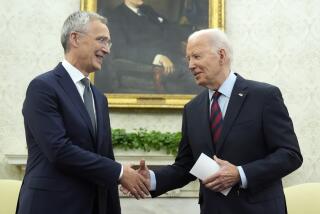7 NATO Allies Fail to Agree on U.S. Bid to Join ‘Star Wars’ Research
- Share via
BONN — After two days of talks, foreign and defense ministers from seven European members of the North Atlantic Treaty Organization failed to agree Tuesday on a united response to a U.S. invitation to join in research on space-based defenses against nuclear missiles.
The 14 ministers could only agree to continue to seek a joint stance after the discussions that one West German participant described as “very difficult.”
The ministers were attending the first regular session of the seven-member West European Union since the long-dormant, 30-year old organization was revived last October. Besides West Germany, members include Britain, Belgium, France, Luxembourg, Italy and the Netherlands.
The lack of progress toward a common response on space defenses is seen as a significant setback for France and West Germany. They have consistently argued that only by acting together could the European members of NATO achieve the best terms for participation in research on the Reagan Administration’s Strategic Defense Initiative, also known as “Star Wars.”
French External Relations Minister Roland Dumas argued that durable cooperation is impossible between “two unequal partners”--the United States and any individual European country.
Washington has viewed the efforts toward a joint European position with concern. U.S. officials believe the European discussions give an impression of a divided alliance and could undercut consulting mechanisms that include all alliance members.
Fear of Being Left Behind
Europeans fear the Administration’s $26 billion research program could develop technology that would leave them still farther behind the United States on such research. Consequently, most are eager to participate in the research phase, despite grave reservations about the deployment of space defense systems.
The European union’s initial session indicated that unified positions on most defense matters will be hard to achieve. The ministers agreed to intensify efforts for joint weapons developments, but here, too, difficulties loomed.
“The path toward our aim is long, thorny and very hard,” said West German Defense Minister Manfred Woerner.
‘Collective Consideration’
A communique issued after Tuesday’s session expressed agreement to continue “collective consideration in order to achieve as far as possible a coordinate reaction of their governments to the invitation of the United States. . . .”
According to Dutch and West German officials who attended the meeting, the words “as far as possible” reflect British doubt about the viability of a joint effort.
At a press conference, British Defense Minister Michael Heseltine noted that member countries have already initiated bilateral contacts with Washington on the issue. He said that discussions of the project with the United States will be necessary before any united response can be considered.
“Until we know what opportunities there are, we can’t know to what extent cooperation is possible,” he said.
Heseltine’s remarks were in sharp contrast to those made by France’s Dumas, who echoed West German Foreign Minister Hans-Dietrich Genscher’s opening statement to the meeting.
“Rather than responding in disorder or negatively to the offer made by the American side, what is necessary is the mobilization of Europeans to cooperate, rather than to resign ourselves to events,” Dumas said.
More to Read
Sign up for Essential California
The most important California stories and recommendations in your inbox every morning.
You may occasionally receive promotional content from the Los Angeles Times.










